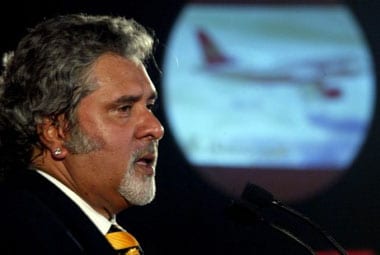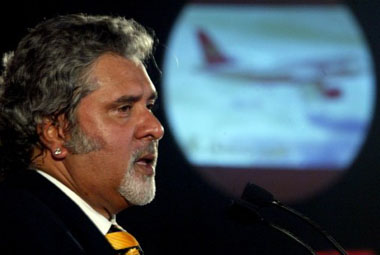United Spirits fund diversion saga has taken a curious twist. In its earnings press release sent to the BSE yesterday, the company has informed that it has received notices from the ministry of corporate affairs and the income tax department for an inspection of its books of accounts and other books. According to the release, MCA seeks to inspect its books under Section 206 (5) of the Companies Act and the I-T depart under Section 131 of the Income Tax Act. Section 206 of the Act accords the government power to call for information, inspect books and conduct inquiries. Sub-section 5 under this allows it to directly inspect books and papers of a company by an inspector appointed by it for the purpose. Similarly, I-T Act Section 131 gives the assessing officer the power for discovery and inspection and compelling the production of books of account and other documents of an assessee. The move by the government is likely to put more pressure on Vijay Mallya, who is trying to cling to the chairman’s post of United Spirits depsite Diageo, the majority shareholder now with about 55 percent stake, asking him o quit. [caption id=“attachment_2267124” align=“alignleft” width=“380”]  AFP[/caption] Here’s how things have unfolded. In September 2014, the board of United Spirit, controlled by Diageo, ordered a probe into the loans given by United Spirits to UB Group companies after the company posted a whopping net loss of Rs 4,488.77 crore for the financial year ended March 31, 2014. The company had made provisions of Rs 1,012.75 crore on account of ‘doubtful loans’ and exceptional item of Rs 3,235.73 crore on sales of Scottish subsidiary, Whyte & Mackay. “Certain pre-existing loans/deposits/advances due to the company and its wholly owned subsidiaries from United Breweries (Holdings) Ltd which were in existence as on March 31, 2013, has been taken into consider atom in the consolidated annual accounts of the company drawn up as of that date,” the company had said then. Managing director and CEO Anand Kripalu was asked to engage independent advisors and specialists in order to carry out the investigation. Kripalu’s enquiry revealed that between 2010 and 2013, funds involved in many transactions were diverted from the company and/or its subsidiaries to certain UB Group companies, including in particular, Kingfisher Airlines Ltd. It is after this report that Diageo asked Mallya to quit the board. He has, however, defied the order. For the three months ended March, United Spirits reported a standalone net loss of Rs 1,799.3 crore. As per the press release the company has sent to the BSE, it has made a provision for Rs 1754.97 crore, which includes loans and advances given various Mallya group companies. Regarding a Rs 995.46 crore loan United Spirits gave away to United Breweries Holding, the auditors’ note says that the committee headed by Kripalu had probed the background to providing such a debt and also the rationale behind charging a 9.5% interest rate on it. The probe had found that between 2010 and 2013, there were certain transactions for which entries were made to show lower exposure to United Breweries. Moreover, the loans were provided for a tenure of eight years for which the repayment were to start only from the end of 6th anniversary of the effective of loan agreement. The loan is repayable in three instalments. “Prima facie, this indicates various improprieties and potential ciolations of provisions, inter alia, of the Companies Act, 1956, and the listing agreement signed by the company with various stock exchanges in India on which securities are listed,” the auditors have said in the note along with the earnings press release. The unfolding fund diversion saga at United Spirits is shocking, to say the least. For one why was UBHL given a moratorium of six full years for loan repayment? This amounts to restructuring of a debt. In other words, the loan repayment started with a restructuring leeway. “The propriety of such fund transfers and the role played by the auditors and the key management personnel is indeed suspect,” Sherry Oommen, corporate lawyer with Nash Capital Partners, has been quoted as saying in The Financial Express. According to him, the auditors have qualified certain transactions, including the write-off provision in loans to Whyte & Mackay Group and other related parties. “Considering the nature of the transaction, the quantum involved, one could argue that the said transaction would qualify as fraud, requiring reporting from the auditors to the central government,” he has told the newspaper. As Oommen says a swift probe by the Serious Frauds Investigation Office is what is warranted. But unfortunately going by the history of our government investigating agencies, a quick outcome is expecting too much from them. But then we always have that classic defence of delayed (or denied?) justice: better late than never.
Unfortunately going by the history of our government investigating agencies, a quick outcome is expecting too much from them
Advertisement
End of Article


)

)
)
)
)
)
)
)
)



